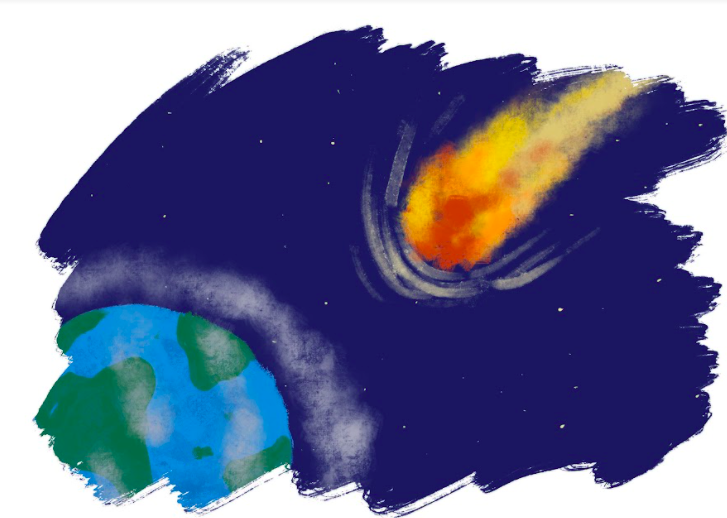
The popular movie “Don’t Look Up,” written and directed by Adam McKay, has fostered widespread conversation within the United States government and general society, specifically in regards to the current climate crisis. The movie has hit record-breaking numbers, becoming the 3rd most-watched movie of all time within the first 28 days of its release, according to Deadline. Despite its somewhat comedic nature, it has generated much controversy amongst its audience. With a stacked cast that includes Leonardo Dicaprio, Meryl Streep, Jennifer Lawrence, Jonah Hill, Timothee Chalamet, and Ariana Grande, the movie set high expectations in early De- cember when it first premiered on Netflix. A plot that seems seemingly basic continues to entertain. In the film, astrologists Dr. Mindy (played by Leonardo DiCaprio) and Kate Dibiasky (played by Jennifer Lawrence) discover a meteorite coming for Earth within 6 months. In spite of their efforts, both scientists fail to gain public support in responding to the cri- sis. President Janie Orlean (played by Meryl Streep) and politician Ja- son Orlean (played by Jonah Hill) fixate on the rich materials present in the meteorite rather than the imminent prospect of humanity’s extinction. The film also features Peter Isherwall, an interesting character representing the richest in the world, such as Elon Musk or Mark Zuckerberg, and the vital role that they play in American society.
The film’s popularity comes in part from the controversial opinions surrounding it. Disagreements have arisen concerning the theme behind the plot and the quality of the film. Deerfield environmental science teachers Toby Emerson and Rich Calhoun assigned “Don’t Look Up” as homework for their classes. Mr. Calhoun said, “[“Don’t Look Up”] is an effective social mirror because when it’s held up to an individual we see in the allegory some issue that we value.” When viewers attempt to pull meaning from the plot, the most prevalent topics in their lives are typically seen as paralleled in this “allegory.” This may explain why so many viewers regard “Don’t Look Up” as satire targeted towards the COVID-19 pandemic. For example, Zoe Gavros ’23 said, “I thought it was about COVID-19 and making fun of the political issues surrounding it.” Director Adam McKay has since spoken out against this hypothesis, explaining that the film was first written in 2018, prior to the outbreak of the pandemic. Aside from its intent, the film compellingly raises discussions that are critical to the current century.
“Don’t Look Up” has received consistent criticism regarding its portrayal of the plot and main theme of climate change. Due to its high-status cast, the movie had a reputation to live up to, and when expectations were not met for some, critics expressed harsh reviews; for instance, the popular movie review website Rotten Tomatoes rated the movie 45% “rotten.” On a similar note, Emma Gurnell ’22 said after watching “Don’t Look Up’’ for her sustain- ability class, “I enjoyed the comedy of it, it just wasn’t what I expected it to be.” Although movie reviewers have shaped a negative narrative surrounding the film, the controversy has only increased the popularity of the film and therefore produced a larger audience.
Personally, after having “Don’t Look Up” assigned as homework for my AP Environmental Science class with Mr. Calhoun, I found the film beneficial and conducive towards contemporary conversations surrounding climate change. Analyzing the film in class and engaging in numerous conversa- tions in my dorm, I have gained a new perspective on the message of climate change. Mr. Calhoun claimed, “This movie will definitely impact the film industry,” especially given that Adam McKay is already writing and planning the release of his next climate-related film. Whether or not you like the portrayal of the movie, “Don’t Look Up” is worth watching due to the conversations it fosters and the importance of its theme.

